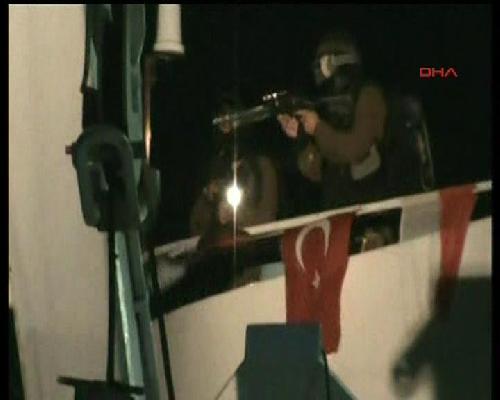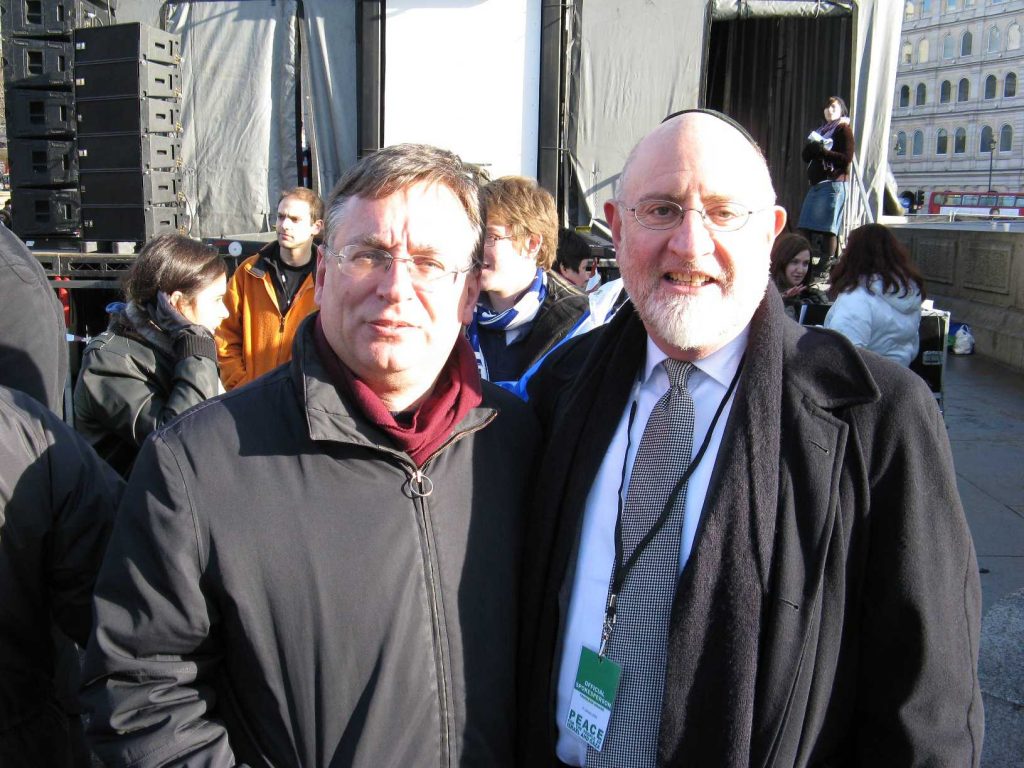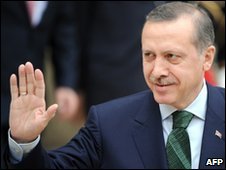Israeli troops attack ship carrying aid to Gaza killing 16
 Israeli commandoes have stormed a flotilla of ships carrying activists and aid supplies to the blockaded Palestinian enclave of Gaza, killing as many as 16 of those on board.
Israeli commandoes have stormed a flotilla of ships carrying activists and aid supplies to the blockaded Palestinian enclave of Gaza, killing as many as 16 of those on board.
By Richard Spencer, Middle East Correspondent and Matthew Kalman in Jerusalem
Link to Al Jazeera’s report on board the Mavi Marmara before communications were cut:
Fighting broke out between the activists and the masked Israeli troops, who rappelled on to deck from helicopters before dawn.
A spokeswoman for the flotilla, Greta Berlin, said she had been told ten people had been killed and dozens wounded, accusing Israeli troops of indiscriminately shooting at “unarmed civilians”. But an Israeli radio station said that between 14 and 16 were dead in a continuing operation.
“How could the Israeli military attack civilians like this?” Ms Berlin said. “Do they think that because they can attack Palestinians indiscriminately they can attack anyone?
“We have two other boats. This is not going to stop us.”
The Israeli government’s handling of the confrontation was under intense international pressure even as it continued. The Israeli ambassador to Turkey, the base of one of the human rights organisation which organised the flotilla, was summoned by the foreign ministry in Ankara, as the Israeli consulate in Istanbul came under attack.
One Israeli minister issued immediate words of regret. “The images are certainly not pleasant. I can only voice regret at all the fatalities,” Binyamin Ben-Eliezer, the trade and industry minister, told army radio.
But he added that the commandoes had been attacked with batons and activists had sought to take their weapons off them.
Israeli military sources said four of its men had been injured, one stabbed, and that they had been shot at.
“The flotilla’s participants were not innocent and used violence against the soldiers. They were waiting for the forces’ arrival,” they were quoted by a news website as saying.
The flotilla had set sail on Sunday from northern, or Turkish, Cyprus. Six boats were led by the Mavi Marmara, which carried 600 activists from around the world, including Mairead Corrigan Maguire, the Northern Ireland peace protester who won a Nobel Prize in 1976.
It came under almost immediate monitoring from Israeli drones and the navy, with two vessels flanking it in international waters. The flotilla, which had been warned that it would not be allowed to reach Gaza, attempted to slow and change course, hoping to prevent a confrontation until daylight, when the Israeli military action could be better filmed.
But in the early hours of this morning local time commandoes boarded from helicopters.
The activists were not carrying guns, but television footage shown by al-Jazeera and Turkish television channels show hand-to-hand fighting, with activists wearing life-jackets striking commandoes with sticks.
The Israeli army said its troops were assaulted with axes and knives.
The television footage did not show firing but shots could be heard in the background. One man was shown lying unconscious on the deck, while another man was helped away.
A woman wearing hijab, the Muslim headscarf, was seen carrying a stretcher covered in blood.
The al-Jazeera broadcast stopped with a voice shouting in Hebrew: “Everyone shut up”.
Israel imposed its blockade on Gaza after the strip was taken over by the militant group Hamas in 2007. It has allowed some food and medical supplies through, but has prevented large-scale rebuilding following the bombardment and invasion of 2008-9.
The flotilla is the latest in a series of attempts by activists to break through the blockade. The boats were carrying food and building supplies.
Activists said at least two of the other boats, one Greek and one Turkish, had been boarded from Israeli naval vessels. Activists said two of the other boats in the flotilla were American-flagged.
The confrontation took place in international waters 80 miles off the Gaza coast.
It was attacked by the head of the Hamas government in Gaza, Ismail Haniyeh.
“We call on the Secretary-General of the U.N., Ban Ki-moon, to shoulder his responsibilities to protect the safety of the solidarity groups who were on board these ships and to secure their way to Gaza,” he said.
Turkish television meanwhile showed hundreds of protesters trying to storm the Israeli consulate in Istanbul. The incident will be particularly damaging for Israel’s relations with what had been seen as its closest ally in the Muslim world.
“By targeting civilians, Israel has once again shown its disregard for human life and peaceful initiatives,” a Turkish foreign ministry statement said. “We strongly condemn these inhumane practices of Israel.
“This deplorable incident, which took place in open seas and constitutes a fragrant breach of international law, may lead to irreparable consequences in our bilateral relations.”
https://www.telegraph.co.uk/news/worldnews/middleeast/palestinianauthority/7789175/Israeli-troops-attack-ship-carrying-aid-to-Gaza-killing-16.html
[2]
31 May 2010, [Turkish Ministry of Foreign Affairs] Press Release Regarding the Use of Force by the Israeli Defense Forces Against the Humanitarian Aid Fleet to Gaza
We protest in the strongest terms the use of force by the Israeli Defense Forces against the civilians from many countries who want to transport humanitarian assistance to the people in Gaza, and among whom there are women and children, which, according to the initial information available, resulted in the death of 2 persons and injury of more than 30 people.
Israel has once again clearly demonstrated that it does not value human lives and peaceful initiatives through targeting innocent civilians. We strongly condemn these inhuman acts of Israel. This grave incident which took place in high seas in gross violation of international law might cause irreversible consequences in our relations.
Besides the initiatives being conducted by our Embassy in Tel Aviv, this unacceptable incident is being strongly protested and explanation is demanded from Israeli Ambassador in Ankara, who has been invited to our Ministry.
Whatsoever the motives might be, such actions against civilians who are involved only in peaceful activities cannot be accepted. Israel will have to bear the consequences of these actions which constitute a violation of international law.
May God bestow His mercy upon those who lost their lives. We wish to express our condolences to the bereaved families of the deceased, and swift recovery to the wounded.
[3]
Israel is a terrorist state by definition: Chomsky
Avram Noam Chomsky, 80, is an American linguist, philosopher, cognitive scientist, political activist, author, and lecturer. He is an Institute Professor emeritus and professor emeritus of linguistics at the Massachusetts Institute of Technology. Chomsky is well known in the academic and scientific community as the father of modern linguistics. Since the 1960s, he has become known more widely as a political dissident, and a libertarian socialist intellectual.
Following is an excerpt of Professor Chomsky’s interview with Christiana Voniati, who is head of International News Department POLITIS Newspaper, Nicosia, Cyprus.
Voniati: The international public opinion and especially the Muslim world seem to have great expectations from the historic election of Obama. Can we, in your opinion, expect any real change regarding the U.S. approach to the Israeli-Palestinian conflict?
Chomsky: Not much. Quite the contrary: it may be harsher than before. In the case of Gaza, Obama maintained silence, he didn’t say a word. He said well there’s only one president so I can’t talk about it. Of course he was talking about a lot of other things but he chose not to talk about this. His campaign did repeat a statement that he had made while visiting Israel six months earlier — he had visited Sderot where the rockets hit- and he said “if this where happening to my daughters, I wouldn’t think of any reaction as legitimate”, but he couldn’t say anything about Palestinian children. Now, the attack on Gaza was at time so that it ended right before the inauguration, which is what I expected. I presume that the point was so that they could make sure that Obama didn’t have to say something, so he didn’t. And then he gave his first foreign policy declaration, it was a couple of days later when he appointed George Mitchell as his emissary, and he said nothing about Gaza except that “our paramount interest is preserving the security of Israel”. Palestine apparently doesn’t have any requirement of security. And then in his declaration he said of course we are not going to deal with Hamas — the elected government the U.S. immediately, as soon as the government was elected in a free election the U.S. and Israel with the help of European Union immediately started severely punishing the Palestinian population for voting in the “wrong way” in a free election and that’s what we mean by democracy. The only substantive comment he made in the declaration was to say that the Arab peace plan had constructive elements, because it called for a normalization of relations with Israel and he urged the Arab states to proceed with the normalization of relations. Now, he is an intelligent person, he knows that that was not what the Arab peace plan said. The Arab peace plan called for a two state settlement on the international border that is in accord with the long standing international consensus that the U.S. has blocked for over 30 years and in that context of the two state settlement we should even proceed further and move towards a normalization of relations with Israel. Well, Obama carefully excluded the main content about the two state settlement and just talked about the corollary, for which a two state settlement is a precondition. Now that’s not an oversight, it can’t be. That’s a careful wording, sending the message that we are not going to change their (Israel’s) rejectionist policy. We’ll continue to be opposed to the international consensus on this issue, and everything else he said accords with it. We will continue in other words to support Israel’s settlement policies — those policies are undermining any possible opportunity or hope for a viable Palestinian entity of some kind. And it’s a continued reliance on force in both parts of occupied Palestine. That’s the only conclusion you could draw.
Voniati: Let U.S. talk about the timing of the assault on the Gaza Strip. Was it accidental or did it purposefully happen in a vacuum of power? To explain myself, the global financial crisis has challenged the almost absolute U.S. global hegemony. Furthermore, the attack on Gaza was launched during the presidential change of guard. So, did this vacuum of power benefit the Israeli assault on Gaza?
Chomsky: Well, the timing was certainly convenient since attention was focused elsewhere. There was no strong pressure on the president or other high officials of the U.S. to say anything about it. I mean Bush was on his way out, and Obama could hide behind the pretext that he’s not yet in. And pretty much the same was in Europe, so that they could just say, well we can’t talk about it now, it’s too difficult a time. The assault was well chosen in that respect. It was well chosen in other respects too: the bombing began shortly after Hamas had offered a return to the 2005 agreement, which in fact was supported by the U.S. They said, ok, let’s go back to the 2005 agreement that was before Hamas was elected. That means no violence and open the borders. Closing the borders is a siege, it’s an act of war……… not very harmful but it’s an act of war. Israel of all countries insists on that. I mean Israel went to war twice in 1956 and 1967 on the grounds, it claimed, that its access to the outside world was being hampered. It wasn’t a siege, its access through the Gulf of Aqaba was being hampered. Well if that is an act of war then certainly a siege is, and so it’s understood.
So Khaled Mashaal asked for an end of the state of the war, which would include opening the borders. Well, a couple of days later, when Israel didn’t react to that, Israel attacked. The attack was timed for Saturday morning — the Sabbath day in Israel — at about 11:30, which happens to be the moment when children are leaving school and crowds are milling in the streets of this very heavily crowded city… The explicit target was police cadets… Now, there are civilians, in fact we now know that for several months the legal department of the Israeli army had been arguing against this plan because it said it was a direct attack against civilians. And of course, plenty civilians will be killed if you bomb a crowded city, especially at a time like that. But finally the legal department was sort of bludgeoned into silence by the military so they said alright. So that’s when they opened –on a Sabbath morning. Now two weeks later, Israel — on Saturday as well — blocked the humanitarian aid because they didn’t want to disgrace Sabbath. Well, that’s interesting too. But the main point about the timing was that there was an effort to undercut the efforts for a peaceful settlement and it was terminated just in time to prevent pressure on Obama to say something about it. It’s hard to believe that this isn’t conscious. We know that it was very meticulously planned for many months beforehand.
Voniati: In a recent interview with LBC, you said that the policies of Hamas are more conducive to peace than the United States’ or Israel’s.
Chomsky: Oh yes, that’s clear.
Voniati: Also, that the policies of Hamas are closer to international consensus on a political peaceful settlement than those of Israel and the U.S. Can you explain your stance?
Chomsky: Well for several years Hamas has been very clear and explicit, repeatedly, that they favor a two state settlement on the international border. They said they would not recognize Israel but they would accept a two state settlement and a prolonged truce, maybe decades, maybe 50 years. Now, that’s not exactly the international consensus but it’s pretty close to it. On the other hand, the United States and Israel flatly reject it. They reject it in deeds, that’s why they are building all the construction development activities in the West Bank, not only in violation of international laws, U.S. and Israel know that the illegal constructions are designed explicitly to convert the West Bank into what the architect of the policy, Arial Sharon, called bantustan. Israel takes over what it wants, break up Palestine into unviable fragments. That’s undermining a political settlement. So in deeds, yes of course they are undermining it, but also in words: that goes back to 1976 when the U.S. vetoed the Security Council resolution put forward by the Arab states which called for a two state settlement and it goes around until today. In December, last December, at the meetings of the UN’s General Assembly there were many resolutions passed. One of them was a resolution calling for recognition of the right of self-determination of the Palestinian people. It didn’t call for a state, just the right of self-determination. It passed with 173 to 5. The 5 were the U.S, Israel and a few small pacific islands. Of course that can’t be reported in the U.S. So they are rejecting it even in words, as well as — more significantly- in acts. On the other hand, Hamas comes pretty close to accepting it. Now, the demand which Obama repeated on Hamas is that they must meet three conditions: they must recognize Israel’s right to exist, they must renounce violence and they must accept past agreements, and in particular the Road Map. Well, what about the U.S. and Israel? I mean, obviously they don’t renounce violence, they reject the Road Map — technically they accepted it but Israel immediately entered 14 reservations (which weren’t reported here) which completely eliminated its content, and the U.S. went along. So the U.S. and Israel completely violate those two conditions, and of course they violate the first, they don’t recognize Palestine. So sure, there’s a lot to criticize about Hamas, but on these matters they seem to be much closer to — not only international opinion — but even to a just settlement than the U.S. and Israel are.
Voniati: On the other hand, Hamas has been accused of using human shields to hide and protect itself. Israel insists that the war was a matter of defense. Is Hamas a terrorist organization, as it is accused to be? Is Israel a terrorist state?
Chomsky: Well, Hamas is accused of using human shields, rightly or wrongly. But we know that Israel does it all the time. Is Israel a terrorist state? Well yes according to official definitions. I mean, one of the main things holding up ceasefire right now is that Israel insists that it will not allow a ceasefire until Hamas returns a captured Israeli soldier Gilad Shalit — he’s very famous in the West everybody knows he was captured. Well, one day before Gilad Shalit was captured, Israeli forces went into Gaza City and kidnapped two Palestinian civilians (the Muamar Brothers) and brought them across the border to Israel in violation of international law and hid them somewhere in the huge Israeli prisons. Nobody knows what happened to them since. I mean, kidnapping civilians is a much worse crime than capturing a soldier of an attacking army. And furthermore this has been regular Israeli practice for decades. They’ve been kidnapping civilians in Lebanon or on the high seas…They take them to Israel, put them into prisons, sometimes keeping them as hostages for long periods. So you know, if the capturing of Gilad Shalit is a terrorist act, well, then Israel’s regular practice supported by the U.S. is incomparably worse. And that’s quite apart from repeated aggression and other crimes.
Voniati: Though of Jewish decent, you have been repeatedly accused of anti-Semitism. How do you respond?
Chomsky: The most important comment about that was made by the distinguished statesman Abba Eban, maybe 35 years ago, in an address to the American people. He said that there are two kinds of criticism of Zionism (by Zionism I mean the policies of the state of Israel). One is criticism by anti-Semites and the other is criticism by neurotic self-hating Jews. That eliminates 100% of possible criticism. The neurotic self-hating Jews, he actually mentioned two, I was one and I.F. Stone, a well-known writer was another). I mean that’s the kind of thing that would come out of a communist party in its worst days. But you see, I can’t really be called anti-Semite because I’m Jewish so I must be a neurotic self-hating Jew, by definition. The assumption is that the policies of the state of Israel are perfect, so therefore any kind of criticism must be illegitimate. And that’s from Abba Eban, one of the most distinguished figures in Israel, the most westernized … praised, considered a dove.
Source: Countercurrents.org
 As I write this piece the scale of the Israeli lethal slaughter at sea is yet to be clear. However we already know that at around 4am Gaza time, hundreds of IDF commandos stormed the Free Gaza international humanitarian fleet. We learn from the Arab press that at least 16 peace activists have been murdered and more than 50 were injured. Once again it is devastatingly obvious that Israel is not trying to hide its true nature: an inhuman murderous collective fuelled by a psychosis and driven by paranoia.
As I write this piece the scale of the Israeli lethal slaughter at sea is yet to be clear. However we already know that at around 4am Gaza time, hundreds of IDF commandos stormed the Free Gaza international humanitarian fleet. We learn from the Arab press that at least 16 peace activists have been murdered and more than 50 were injured. Once again it is devastatingly obvious that Israel is not trying to hide its true nature: an inhuman murderous collective fuelled by a psychosis and driven by paranoia.








![Turkish PM Erdogan says Israel is 'threat to peace' 13 Israeli Deputy Foreign Minister Danny Ayalon meeting Turkish Ambassador Ahmet Oguz Celikkol, captioned "the height of humiliation" in Israeli newspaper Israel Hayom [Image: Lior Mizrahi/Israel Hayom]](http://newsimg.bbc.co.uk/media/images/47602000/jpg/_47602916_ayalon226.jpg)